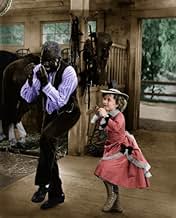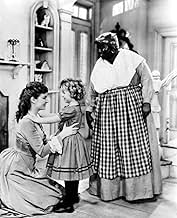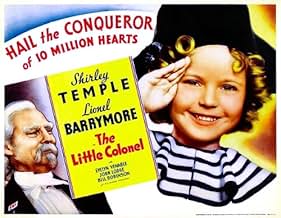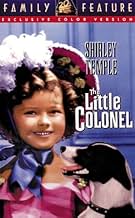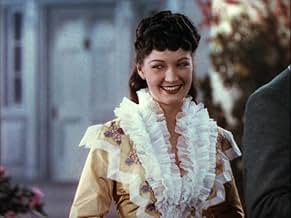In the post-Civil war south, a darling little girl attempts to restore the peace between her parents and her plantation owner grandfather.In the post-Civil war south, a darling little girl attempts to restore the peace between her parents and her plantation owner grandfather.In the post-Civil war south, a darling little girl attempts to restore the peace between her parents and her plantation owner grandfather.
- Awards
- 2 wins & 1 nomination total
Stephen Chase
- Hull
- (as Alden Chase)
C.E. Anderson
- Overseer
- (uncredited)
Martin Faust
- Frontiersman
- (uncredited)
Rolland Hamblen
- Trooper Doing Egg Trick
- (uncredited)
Frank Hammond
- Carriage Driver
- (uncredited)
Featured reviews
I grew up with Shirley Temple. In 1932 she made 12 movies as an adorable baby doll of four years old. In 1933 she made four films; in 1934 eleven films the best was "Stand Up & Cheer" and "Baby, Take A Bow". In 1935 four films; in 1936 Captain January", in 1937 "Heidi"; in 1938 "Rebecca of Sunnybrook Farm" and "The Little Princess". In 1940 two movies, and in 1941 her first flop. 1944 she made a comeback in "Since You Went Away" and "I'll Be Seeing You". 1947 she made three films including "Bachelor & the Bobby Soxer". 1948 "Fort Apache" when she met her first husband John Agar. In 1949 she made four good films the best of which was "A Kiss for Corliss". Nobody wanted little Shirley to grow up, so I must say my favorite film of hers was "The Little Colonel" in which she sang and danced so well with the famed Bill Robinson. In that film she played against the great Lionel Barrymore.
Having earned her nickname due to her stubborn temper, THE LITTLE COLONEL courageously tries to reunite her splintered family.
Shirley Temple smiles, pouts, tosses her curly locks and completely runs away with the movie. One of her early family classics, this is an excellent showcase for her tremendous charm & abundant talents. As box-office queen, the mighty moppet would dominate Hollywood during the second half of the 1930's. Never was a despot so welcomed or a tyrant so loved.
As one of the industry's finest character actors, crusty Lionel Barrymore gives the little lady a run for her money. Always entertaining, he knows when to purr or when to roar to maximum effect, even if he doesn't quite eclipse Little Miss Personality.
Hattie McDaniel adds her own unique gifts to the role of Shirley's faithful servant, never allowing her dignity to be demeaned. As always, she is a joy. The legendary Bill Robinson is also on hand, mostly, one suspects, so as to partner Shirley in a couple of dances and they are wonderful, especially in Robinson's signature Staircase Dance. They are perfectly matched - one ramrod straight & ebony, the other tiny & blonde - and their minutes together on the screen is the stuff of which movie magic is made.
Evelyn Venable & John Lodge, as Shirley's parents (it's rare for her to have both all the way through a film) do nicely with the romantic angle, but it's kept to a minimum, as is usual in a Temple film, where the spotlight is kept firmly focused on her. Sidney Blackmer appears as a smooth swindler who makes the serious mistake of angering THE LITTLE COLONEL.
Although the film is given good production values by 20th Century Fox, it is the interaction between little Shirley and the other performers which far and away is the most important aspect of the picture.
It should be noted that there are elements of racism in the story line, a not uncommon occurrence in Hollywood films of the 1930's.
The final scene segues into early Technicolor - a pleasant way to end the story.
Shirley Temple smiles, pouts, tosses her curly locks and completely runs away with the movie. One of her early family classics, this is an excellent showcase for her tremendous charm & abundant talents. As box-office queen, the mighty moppet would dominate Hollywood during the second half of the 1930's. Never was a despot so welcomed or a tyrant so loved.
As one of the industry's finest character actors, crusty Lionel Barrymore gives the little lady a run for her money. Always entertaining, he knows when to purr or when to roar to maximum effect, even if he doesn't quite eclipse Little Miss Personality.
Hattie McDaniel adds her own unique gifts to the role of Shirley's faithful servant, never allowing her dignity to be demeaned. As always, she is a joy. The legendary Bill Robinson is also on hand, mostly, one suspects, so as to partner Shirley in a couple of dances and they are wonderful, especially in Robinson's signature Staircase Dance. They are perfectly matched - one ramrod straight & ebony, the other tiny & blonde - and their minutes together on the screen is the stuff of which movie magic is made.
Evelyn Venable & John Lodge, as Shirley's parents (it's rare for her to have both all the way through a film) do nicely with the romantic angle, but it's kept to a minimum, as is usual in a Temple film, where the spotlight is kept firmly focused on her. Sidney Blackmer appears as a smooth swindler who makes the serious mistake of angering THE LITTLE COLONEL.
Although the film is given good production values by 20th Century Fox, it is the interaction between little Shirley and the other performers which far and away is the most important aspect of the picture.
It should be noted that there are elements of racism in the story line, a not uncommon occurrence in Hollywood films of the 1930's.
The final scene segues into early Technicolor - a pleasant way to end the story.
This is one movie everyone should watch, if only to see the remarkable Shirley Temple. Who's the child star to end all child stars! Not only is her talent for acting amazing in a seven-year-old, but she sings and dances so incredibly! (If her parents bragged about her, they had every right to.) There's also the outstanding performances of Lionel Barrymore, Hattie McDaniel, and Bill (Bojangles) Robinson to add to the picture. With all this talent, you won't be bored!
The story itself is typical of 1930's melodrama. It takes place in Kentucky in the 1870's, where widower Colonel Lloyd (Barrymore) is still fighting the Civil War in his heart after losing his son, and won't except his daughter, Elizabeth's engagement to "Yankee" Jack. Nothing will change his mind, but Elizabeth won't give up the man she loves and leaves to marry him, despite her father's intent to cut her out of his life. Six years later, Elizabeth returns to the south (after living in Philadelphia and out west) with her daughter (also "Colonel" Lloyd, her first name being her mother's maiden name and the "Colonel" an honorary title given by the men at the army base where they stayed, who she completely charmed), Jack having stayed out west to try his hand at prospecting. They stay at the cottage which was willed to Elizabeth by her mother, and it soon becomes apparent that her father has not forgiven her. There're problems ahead, with lack of money (Elizabeth's too proud to ask for her father's help), Jack returning, after being swindled in a prospecting deal and then falling ill, villains turning up to cause more trouble, and resolutions and reconciliations to come.
But the story takes a back seat to Shirley, as she makes her way into her grandfather's life and his heart. The scenes between her and Lionel are priceless, especially when they argue, and the hot-tempered little miss throws mud on him! (Well, he did say some unkind words about her mother.) It's so touching when they get to be friends, though each has a bit of trouble from time to time controlling their temper. These two were very well matched!
Nothing tops the show-stopping scene of Shirley dancing on the stairs with Bill Robinson, who plays the Colonel's butler. And any scenes with Hattie McDaniel are superb. (When is she not?) The two children who become friends with Shirley deserve a mention, for their acting was good, and the little boy was so adorable!
It's a short movie (less than 90 minutes), good for a time when you just want to sit and relax, and shut out the crazy world of today, by spending some time in yesterday.,
The story itself is typical of 1930's melodrama. It takes place in Kentucky in the 1870's, where widower Colonel Lloyd (Barrymore) is still fighting the Civil War in his heart after losing his son, and won't except his daughter, Elizabeth's engagement to "Yankee" Jack. Nothing will change his mind, but Elizabeth won't give up the man she loves and leaves to marry him, despite her father's intent to cut her out of his life. Six years later, Elizabeth returns to the south (after living in Philadelphia and out west) with her daughter (also "Colonel" Lloyd, her first name being her mother's maiden name and the "Colonel" an honorary title given by the men at the army base where they stayed, who she completely charmed), Jack having stayed out west to try his hand at prospecting. They stay at the cottage which was willed to Elizabeth by her mother, and it soon becomes apparent that her father has not forgiven her. There're problems ahead, with lack of money (Elizabeth's too proud to ask for her father's help), Jack returning, after being swindled in a prospecting deal and then falling ill, villains turning up to cause more trouble, and resolutions and reconciliations to come.
But the story takes a back seat to Shirley, as she makes her way into her grandfather's life and his heart. The scenes between her and Lionel are priceless, especially when they argue, and the hot-tempered little miss throws mud on him! (Well, he did say some unkind words about her mother.) It's so touching when they get to be friends, though each has a bit of trouble from time to time controlling their temper. These two were very well matched!
Nothing tops the show-stopping scene of Shirley dancing on the stairs with Bill Robinson, who plays the Colonel's butler. And any scenes with Hattie McDaniel are superb. (When is she not?) The two children who become friends with Shirley deserve a mention, for their acting was good, and the little boy was so adorable!
It's a short movie (less than 90 minutes), good for a time when you just want to sit and relax, and shut out the crazy world of today, by spending some time in yesterday.,
Wow, I have not visited this film in ages. To see it again in the autumn of my days was a real eye opener. Ok, the story line is thin, yet the engagement of the actors WITH one another in the screen is palatable to this day. Hey, it may be cringeworthy by our standards in the context of race. Yet if one views this piece in its historical context, everyone had a job to do and was re-enacting a rosey vision of a Harmonious lifestyle post Civil War. If you get past that you can see a period of life re-enacted on the screen for what it was. The ACTING...is tremendous on such a thin story line. NO CHILD actor to this day comes CLOSE to holding her own with the likes of Lionel Barrymore, or Bill Robinson. This little Ball of talent allows you to sit back and WISH your child was as kind an reasonable as this little gal acts. All top shelf actors with this little gem...Evelyn Venable and the Lovely Hattie McDaniel help us to see that on good days in the South, most everythin' was fine. The story was taken from a novel that was based on REAL PEOPLE of that period in a REAL location called Peewee Valley, Kentucky. Ok so it's schmultzy. Yet... could a movie which encapsulates a time period so distinctly as this be made today? No way! The intensity of the actors, taking the subject matter seriously, giving it their all... pure FUN!
The opening scene of "The Little Colonel" is set somewhere in the Deep South in the 1870s. The Civil War had been over for years, but plantation owner, Colonel Lloyd, still carried a hatred for the Yankees. When his daughter, Elizabeth, plans to marry a man from the North, Jack Sherman, Lloyd disowns her. Segue to six years later, at an Army cavalry post somewhere in the Northwest, and a special formation has been called by Colonel Gray for the commissioning of a new officer. Six-year-old Lloyd Sherman is commissioned a colonel in the U. S. Army. She is the daughter of Jack and Elizabeth Sherman, and has endeared herself to the whole post.
So sets the stage for this movie that stars six-year-old Shirley Temple as Lloyd Sherman - that is, Colonel Lloyd Sherman. Lionel Barrymore plays her grandfather, Col. Lloyd, Evelyn Venable plays Elizabeth and John Lodge plays Jack Sherman. But the best of the supporting cast in this film - after Barrymore, are the black servants who have stayed on the Lloyd's plantation after the Civil War abolished slavery. Bill Robinson plays the colonel's butler, Walker, and Hattie McDaniel plays the cook, Mom Beck. They share of the singing and dancing with young Shirley that add the musical aspects to the comedy drama and family film.
Robinson's staircase dance routine is memorable, and one has to note that he was "no spring chicken" when this movie was made. Robinson was the same age as Barrymore, 57, with both actors having been borne in 1878. Barrymore had to don the white hair and beard to look older, and Robinson may have had some sprinkling of powder for the light touch of white in his hair. Robinson went by the nickname, Bojangles, and was one of the best tap dancers in the world. He started young and performed in vaudeville, on stage and in the movies. And, Hattie McDaniel would become the first African-American to win an Academy Award, in 1940. She won the best supporting actress for her role as Mammy, in the great 1939 production of "Gone With the Wind."
The plot for this film is a good story in which the young Colonel Lloyd Sherman resolves all the problems and disagreements and it ends happily for everyone - well, except for a couple of bad guys who, we assume get what's coming to 'em.
I enjoyed watching this film again - these many, many years after seeing it on late night TV in the 1950s-60s. And, this time in color. Here are a couple of favorite lines from the film.
Dr. Scott, "Marriage is a wonderful institution." Colonel Lloyd, "Yes, us, no family should be without it."
May Lily, "You can't be no colonel." Lloyd Sherman, "Why not?" May Lily, "Because you ain't got no whiskers." Lloyd Sherman, "I don't need to have whiskers. I've got a temper. That's all you need to be a colonel."
So sets the stage for this movie that stars six-year-old Shirley Temple as Lloyd Sherman - that is, Colonel Lloyd Sherman. Lionel Barrymore plays her grandfather, Col. Lloyd, Evelyn Venable plays Elizabeth and John Lodge plays Jack Sherman. But the best of the supporting cast in this film - after Barrymore, are the black servants who have stayed on the Lloyd's plantation after the Civil War abolished slavery. Bill Robinson plays the colonel's butler, Walker, and Hattie McDaniel plays the cook, Mom Beck. They share of the singing and dancing with young Shirley that add the musical aspects to the comedy drama and family film.
Robinson's staircase dance routine is memorable, and one has to note that he was "no spring chicken" when this movie was made. Robinson was the same age as Barrymore, 57, with both actors having been borne in 1878. Barrymore had to don the white hair and beard to look older, and Robinson may have had some sprinkling of powder for the light touch of white in his hair. Robinson went by the nickname, Bojangles, and was one of the best tap dancers in the world. He started young and performed in vaudeville, on stage and in the movies. And, Hattie McDaniel would become the first African-American to win an Academy Award, in 1940. She won the best supporting actress for her role as Mammy, in the great 1939 production of "Gone With the Wind."
The plot for this film is a good story in which the young Colonel Lloyd Sherman resolves all the problems and disagreements and it ends happily for everyone - well, except for a couple of bad guys who, we assume get what's coming to 'em.
I enjoyed watching this film again - these many, many years after seeing it on late night TV in the 1950s-60s. And, this time in color. Here are a couple of favorite lines from the film.
Dr. Scott, "Marriage is a wonderful institution." Colonel Lloyd, "Yes, us, no family should be without it."
May Lily, "You can't be no colonel." Lloyd Sherman, "Why not?" May Lily, "Because you ain't got no whiskers." Lloyd Sherman, "I don't need to have whiskers. I've got a temper. That's all you need to be a colonel."
Did you know
- TriviaShirley Temple memorized every line of dialogue in this movie, and while filming a scene with Lionel Barrymore, the veteran actor forgot a line. When Temple prompted him, Barrymore flew into a such a rage that one crew member took Temple away for fear that Barrymore might harm her. He later apologized to her, and they remained friends for many years.
- GoofsMom Beck telling Lloyd that her mother also had golden curls and pink cheeks as a child when her mother is brunette is not necessarily an error. Many blonde children's hair darkens as they age. Shirley Temple's hair darkened as she grew older and was also dark brunette as an adult.
- Quotes
Col. Lloyd: For your years and weight, you're probably the stubbornest person in this county.
Miss Lloyd Sherman: You weigh a lot more than I do!
- Alternate versionsAlso available in a computer colorized version.
- ConnectionsFeatured in Concept (1964)
- SoundtracksLove's Young Dream
(uncredited)
Lyrics by Thomas Moore
Played on harp and sung by Evelyn Venable (dubbed)
Later Sung by Shirley Temple
- How long is The Little Colonel?Powered by Alexa
Details
- Release date
- Country of origin
- Language
- Also known as
- La pequeña rebelde
- Production company
- See more company credits at IMDbPro
- Runtime
- 1h 21m(81 min)
- Color
- Aspect ratio
- 1.37 : 1
Contribute to this page
Suggest an edit or add missing content



